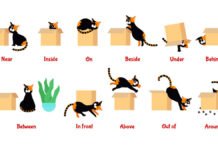A tag question is a special construction in English. It is a statement followed by a mini-question. We use tag questions to ask for confirmation. They mean something like: “Is that right?” or “Do you agree?” They are very common in English.
The basic structure of a tag question is:
| positive statement | negative tag |
| Snow is white, | isn’t it? |
| negative statement | positive tag |
| You don’t like me, | do you? |
Notice that the tag repeats the auxiliary verb (or the main verb when be) from the statement and changes it to negative or positive.
Positive Statement Tag Questions
Look at these examples with positive statements. You will see that most of the time, the auxiliary verb from the positive statement is repeated in the tag and changed to negative.
| (+) positive statement | (-) negative tag | |||||
| subject | auxiliary | main verb | auxiliary | not | personal pronoun same as subject | |
| You | are | coming, | are | n’t | you? | |
| We | have | finished, | have | n’t | we? | |
| You | do | like | coffee, | do | n’t | you? |
| You | like | coffee, | do | n’t | you? | |
| They | will | help, | wo | n’t | they? | |
| I | can | come, | can | ‘t | I? | |
| We | must | go, | must | n’t | we? | |
| He | should | try | harder, | should | n’t | he? |
| You | are | English, | are | n’t | you? | |
| John | was | there, | was | n’t | he? | |
Negative Statement Tag Questions
Look at these examples with negative statements. Notice that the negative verb in the original statement is changed to positive in the tag.
| (-) negative statement | (+) positive tag | ||||||
| subject | auxiliary | main verb | auxiliary | personal pronoun same as subject | |||
| It | is | n’t | raining, | is | it? | ||
| We | have | never | seen | that, | have | we? | |
| You | do | n’t | like | coffee, | do | you? | |
| They | will | not | help, | will | they? | ||
| They | wo | n’t | report | us, | will | they? | |
| I | can | never | do | it right, | can | I? | |
| We | must | n’t | tell | her, | must | we? | |
| He | should | n’t | drive | so fast, | should | he? | |
| You | wo | n’t | be | late, | will | you? | |
| You | are | n’t | English, | are | you? | ||
| John | was | not | there, | was | he? | ||
Formation
If there is an auxiliary verb in the statement, we use it to form the question tag.
- I don’t need to finish this today, do I?
- James is working on that, isn’t he?
- Your parents have retired, haven’t they?
- The phone didn’t ring, did it?
- It was raining that day, wasn’t it?
- Your mum hadn’t met him before, had she?
Sometimes there is no auxiliary verb already in the statement.
When the verb in the statement is present simple or past simple and is positive, we use don’t, doesn’t or didn’t:
- Jenni eats cheese, doesn’t she?
- I said that already, didn’t I?
When the verb in the statement is to be in the present simple or past simple, we use to be to make the question tag:
- The bus stop‘s over there, isn’t it?
- None of those customers were happy, were they?
When the verb in the statement is a modal verb, we use the modal verb to make the question tag:
- They could hear me, couldn’t they?
- You won’t tell anyone, will you?
If the main verb or auxiliary verb in the statement is am, the positive question tag is am I? but the negative question tag is usually aren’t I?:
- I‘m never on time, am I?
- I‘m going to get an email with the details, aren’t I?
Answering Tag Questions
How do we answer a tag question? Often, we just say Yes or No. Sometimes we may repeat the tag and reverse it (They don’t live here, do they? Yes, they do). Be very careful about answering tag questions. In some languages, an opposite system of answering is used, and non-native English speakers sometimes answer in the wrong way. This can lead to a lot of confusion!
For example, everyone knows that snow is white. Look at these questions and the correct answers:
| tag question | correct answer | notes | |
| Snow is white, isn’t it? | Yes (it is). | The answer is the same in both cases – because snow is white! | But notice the change of stress when answerer does not agree with questioner. |
| Snow isn’t white, is it? | Yes it is! | ||
| Snow is black, isn’t it? | No it isn’t! | Answer is same in both cases – because snow is not black! | |
| Snow isn’t black, is it? | No (it isn’t). | ||
In some languages, people answer a question like “Snow isn’t black, is it?” with “Yes” (meaning “Yes, I agree with you”). This is the wrong answer in English!
Here are some more examples, with correct answers:
- The moon goes around the earth, doesn’t it? Yes, it does.
- The earth is bigger than the moon, isn’t it? Yes.
- The earth is bigger than the sun, isn’t it? No, it isn’t!
- Asian people don’t like rice, do they? Yes, they do!
- Elephants live in Europe, don’t they? No, they don’t!
- Men don’t have babies, do they? No.
- The English alphabet doesn’t have 40 letters, does it? No, it doesn’t.
Special Cases
| example | notes |
| I am right, aren’t I? | aren’t I (not amn’t I) |
| You have to go, don’t you? | you (do) have to go… |
| I have been answering, haven’t I? | use the first auxiliary |
| Nothing came in the post, did it? | treat statements with nothing, nobody etc like negative statements |
| Let’s go, shall we? | let’s = let us |
| He‘d better do it, hadn’t he? | he had better (no auxiliary) |
Mixed Examples
Here is a list of examples of tag questions in different contexts. Notice that some are “normal” and others seem to break all the rules:
- But you don’t really love her, do you?
- This’ll work, won’t it?
- Oh you think so, do you?
- Well, I couldn’t help it, could I?
- But you’ll tell me if she calls, won’t you?
- We’d never have known, would we?
- Oh, you do, do you?
- The weather’s bad, isn’t it?
- You won’t be late, will you?
- Nobody knows, do they?
- You never come on time, do you?
- You couldn’t help me, could you?
- You think you’re clever, do you?
- So you don’t think I can do it, don’t you? (British English)
- Shut up, will you!
- She can hardly love him after all that, can she?
- Nothing will happen, will it?





























